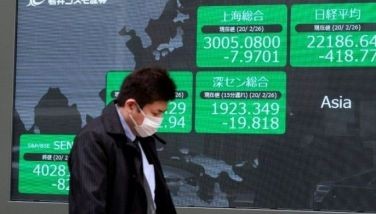News Analysis: Stocks tumble, local currencies weaken in Phl, other Asian emerging economies
MANILA, Philippines (Xinhua) - Fears of a possible military action by Western powers led by the United States against Syria have triggered a rise in global oil prices which, in turn, resulted in the slump of stocks and the weakening of currencies in the Philippines and other Asian emerging economies.
On Wednesday, the main-share Philippine Stock Exchange index ( PSEi) slumped by another 178.93 points or 3.02 percent to close at 5,738.06. The market is now trading at its lowest level for 2013 and lagging its end-2012 level by 1.3 percent, reversing as much as 27 percent in gains earlier in the year.
Also on Wednesday, the Philippine peso lost 25 centavos to close at P44.75 to $1, weaker than the previous close of P44.50: $1. This was the lowest since Sept. 2, 2010, when the local currency closed at 44.95 against the greenback
Reports quoted chief market strategist Jonathan Ravelas of the Banco de Oro, a big local bank, as saying that the peso might weaken to P45.30: $1 in the coming weeks after breaching its resistance level of P44.70: $1.
Analysts said that the tension in the Middle East and a looming row in Washington over the US debt ceiling, which could leave the country in political deadlock, have adversely affected the stocks and currencies of almost all Asian countries.
The Indian rupee, according to reports, fell to record low on Tuesday, leading slides among emerging Asian currencies. The rupee slid after the lower house of the Indian Parliament approved a plan worth nearly $20 billion to provide cheap grain to the poor.
The Indonesian rupiah also hit a fresh four-year low on corporate dollar demand while the Malaysian ringgit was at its lowest rate in more than three years. The Thai baht also slid to a three-year low due to capital outflows.
Despite these negative economic indicators, the international debt watcher Standard & Poor's (S&P) has said that it is unlikely that there will be a repeat of the 1997 financial crisis that saw economies in the region crashing.
In a statement released this week, the S&P said that emerging countries like the Philippines, which rely on domestic demand to drive economic expansion and enjoy a surplus of foreign exchange income, would not be affected.
S&P described two types of external macroeconomic risks, namely "growth" risks and "external financing" risks. Growth risks stem from the openness of the economy.
S&P said smaller, more open and more trade-dependent economies in Asia such as Singapore and China's Hong Kong have higher risks to growth. "In contrast, the larger, more domestically driven economies such as China, India, Indonesia and the Philippines have lower growth risks," S&P said.
According to S&P, the Philippines fares better on current accounts than other countries in the region. A country's current account summarizes what is spent on imports, as well as income from exports and services. Remittances from overseas Filipino workers (OFW) are also counted in the current account.
In the first quarter of the year, the Philippines recorded a current account surplus of $3.44 billion, much higher than the $393 million posted in the same period last year. Indonesia, on the other hand, had a current account deficit of $5.27 billion in the first quarter of 2013.
Meanwhile, the ASEAN Business Outlook Survey 2014 has cited the Philippines as the "most improved" nation among members of the Association of Southeast Asian Nations (ASEAN) with American firms expressing increased satisfaction over the stability of the country's political system.
The survey results showed that satisfaction with the Philippines increased across 14 of the 16 business factors over the last five years.
Dissatisfaction of US companies with the perceived corruption in the Philippines fell to 59 percent in 2013 from a high of 91 percent in 2003, while negative sentiments on the country's infrastructure fell to 55 percent from 69 percent during the same period, the survey showed.
These developments, however, were not enough to propel the Philippines to be one of the most attractive countries for business. The survey showed that Singapore remained one of the most attractive countries in ASEAN to do business, while Indonesia, Vietnam, Thailand and Myanmar were favored for business expansion.
The ASEAN Business Outlook Survey, the key barometer of US business sentiment in Southeast Asia, was conducted between May 10 and June 10. A total of 475 business leaders of US firms were polled on their investment plans, outlook for the region, and perceptions of some of the key challenges and opportunities in the region.
- Latest
- Trending




























